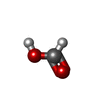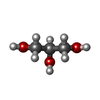[English] 日本語
 Yorodumi
Yorodumi- PDB-5dux: Crystal structure of the human galectin-4 N-terminal carbohydrate... -
+ Open data
Open data
- Basic information
Basic information
| Entry | Database: PDB / ID: 5dux | |||||||||
|---|---|---|---|---|---|---|---|---|---|---|
| Title | Crystal structure of the human galectin-4 N-terminal carbohydrate recognition domain in complex with 2'-fucosyllactose | |||||||||
 Components Components | Galectin-4 | |||||||||
 Keywords Keywords | SUGAR BINDING PROTEIN / galectin-4 / H-antigen / 2'-fucosyllactose / sugar-binding protein | |||||||||
| Function / homology |  Function and homology information Function and homology informationantibacterial peptide biosynthetic process / galactoside binding / : / carbohydrate binding / cell adhesion / extracellular space / plasma membrane / cytosol Similarity search - Function | |||||||||
| Biological species |  Homo sapiens (human) Homo sapiens (human) | |||||||||
| Method |  X-RAY DIFFRACTION / X-RAY DIFFRACTION /  SYNCHROTRON / SYNCHROTRON /  MOLECULAR REPLACEMENT / Resolution: 1.85 Å MOLECULAR REPLACEMENT / Resolution: 1.85 Å | |||||||||
 Authors Authors | Bum-Erdene, K. / Blanchard, H. | |||||||||
| Funding support |  Australia, 1items Australia, 1items
| |||||||||
 Citation Citation |  Journal: Sci Rep / Year: 2016 Journal: Sci Rep / Year: 2016Title: Structural characterisation of human galectin-4 N-terminal carbohydrate recognition domain in complex with glycerol, lactose, 3'-sulfo-lactose, and 2'-fucosyllactose. Authors: Bum-Erdene, K. / Leffler, H. / Nilsson, U.J. / Blanchard, H. | |||||||||
| History |
|
- Structure visualization
Structure visualization
| Structure viewer | Molecule:  Molmil Molmil Jmol/JSmol Jmol/JSmol |
|---|
- Downloads & links
Downloads & links
- Download
Download
| PDBx/mmCIF format |  5dux.cif.gz 5dux.cif.gz | 136.4 KB | Display |  PDBx/mmCIF format PDBx/mmCIF format |
|---|---|---|---|---|
| PDB format |  pdb5dux.ent.gz pdb5dux.ent.gz | 104.1 KB | Display |  PDB format PDB format |
| PDBx/mmJSON format |  5dux.json.gz 5dux.json.gz | Tree view |  PDBx/mmJSON format PDBx/mmJSON format | |
| Others |  Other downloads Other downloads |
-Validation report
| Summary document |  5dux_validation.pdf.gz 5dux_validation.pdf.gz | 1.2 MB | Display |  wwPDB validaton report wwPDB validaton report |
|---|---|---|---|---|
| Full document |  5dux_full_validation.pdf.gz 5dux_full_validation.pdf.gz | 1.2 MB | Display | |
| Data in XML |  5dux_validation.xml.gz 5dux_validation.xml.gz | 26.5 KB | Display | |
| Data in CIF |  5dux_validation.cif.gz 5dux_validation.cif.gz | 38.2 KB | Display | |
| Arichive directory |  https://data.pdbj.org/pub/pdb/validation_reports/du/5dux https://data.pdbj.org/pub/pdb/validation_reports/du/5dux ftp://data.pdbj.org/pub/pdb/validation_reports/du/5dux ftp://data.pdbj.org/pub/pdb/validation_reports/du/5dux | HTTPS FTP |
-Related structure data
| Related structure data | 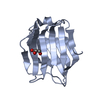 5duuC 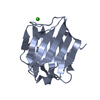 5duvC 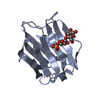 5duwC  3i8tS C: citing same article ( S: Starting model for refinement |
|---|---|
| Similar structure data |
- Links
Links
- Assembly
Assembly
| Deposited unit | 
| ||||||||||||||||||||||||||||||||||||||||||||||||||||||||||||||||||||||||||||||||||||||||||||||||||||||||||||||||||||||||||||||||||||||||||||||||||||||
|---|---|---|---|---|---|---|---|---|---|---|---|---|---|---|---|---|---|---|---|---|---|---|---|---|---|---|---|---|---|---|---|---|---|---|---|---|---|---|---|---|---|---|---|---|---|---|---|---|---|---|---|---|---|---|---|---|---|---|---|---|---|---|---|---|---|---|---|---|---|---|---|---|---|---|---|---|---|---|---|---|---|---|---|---|---|---|---|---|---|---|---|---|---|---|---|---|---|---|---|---|---|---|---|---|---|---|---|---|---|---|---|---|---|---|---|---|---|---|---|---|---|---|---|---|---|---|---|---|---|---|---|---|---|---|---|---|---|---|---|---|---|---|---|---|---|---|---|---|---|---|---|
| 1 | 
| ||||||||||||||||||||||||||||||||||||||||||||||||||||||||||||||||||||||||||||||||||||||||||||||||||||||||||||||||||||||||||||||||||||||||||||||||||||||
| 2 | 
| ||||||||||||||||||||||||||||||||||||||||||||||||||||||||||||||||||||||||||||||||||||||||||||||||||||||||||||||||||||||||||||||||||||||||||||||||||||||
| 3 | 
| ||||||||||||||||||||||||||||||||||||||||||||||||||||||||||||||||||||||||||||||||||||||||||||||||||||||||||||||||||||||||||||||||||||||||||||||||||||||
| 4 | 
| ||||||||||||||||||||||||||||||||||||||||||||||||||||||||||||||||||||||||||||||||||||||||||||||||||||||||||||||||||||||||||||||||||||||||||||||||||||||
| Unit cell |
| ||||||||||||||||||||||||||||||||||||||||||||||||||||||||||||||||||||||||||||||||||||||||||||||||||||||||||||||||||||||||||||||||||||||||||||||||||||||
| Noncrystallographic symmetry (NCS) | NCS domain:
NCS domain segments: Component-ID: _ / Beg auth comp-ID: PRO / Beg label comp-ID: PRO / Refine code: _
NCS ensembles :
|
- Components
Components
| #1: Protein | Mass: 17473.912 Da / Num. of mol.: 4 Fragment: N-terminal carbohydrate recognition domain (UNP residues 1-155) Source method: isolated from a genetically manipulated source Source: (gene. exp.)  Homo sapiens (human) / Gene: LGALS4 / Production host: Homo sapiens (human) / Gene: LGALS4 / Production host:  #2: Polysaccharide | #3: Chemical | ChemComp-FMT / | #4: Chemical | #5: Water | ChemComp-HOH / | |
|---|
-Experimental details
-Experiment
| Experiment | Method:  X-RAY DIFFRACTION / Number of used crystals: 1 X-RAY DIFFRACTION / Number of used crystals: 1 |
|---|
- Sample preparation
Sample preparation
| Crystal | Density Matthews: 1.88 Å3/Da / Density % sol: 34.67 % |
|---|---|
| Crystal grow | Temperature: 293.15 K / Method: vapor diffusion, hanging drop / pH: 8 / Details: 3.5 M sodium formate, 0.1 M Tris |
-Data collection
| Diffraction | Mean temperature: 100 K | |||||||||||||||||||||||||||
|---|---|---|---|---|---|---|---|---|---|---|---|---|---|---|---|---|---|---|---|---|---|---|---|---|---|---|---|---|
| Diffraction source | Source:  SYNCHROTRON / Site: SYNCHROTRON / Site:  Australian Synchrotron Australian Synchrotron  / Beamline: MX2 / Wavelength: 0.9537 Å / Beamline: MX2 / Wavelength: 0.9537 Å | |||||||||||||||||||||||||||
| Detector | Type: ADSC QUANTUM 315r / Detector: CCD / Date: Jul 1, 2014 | |||||||||||||||||||||||||||
| Radiation | Protocol: SINGLE WAVELENGTH / Monochromatic (M) / Laue (L): M / Scattering type: x-ray | |||||||||||||||||||||||||||
| Radiation wavelength | Wavelength: 0.9537 Å / Relative weight: 1 | |||||||||||||||||||||||||||
| Reflection | Resolution: 1.85→45.65 Å / Num. obs: 44028 / % possible obs: 99.1 % / Redundancy: 4 % / CC1/2: 0.998 / Rmerge(I) obs: 0.041 / Rpim(I) all: 0.024 / Net I/σ(I): 22.9 / Num. measured all: 177950 | |||||||||||||||||||||||||||
| Reflection shell | Diffraction-ID: 1 / Rejects: _
|
- Processing
Processing
| Software |
| |||||||||||||||||||||||||||||||||||||||||||||||||||||||||||||||||||||||||||
|---|---|---|---|---|---|---|---|---|---|---|---|---|---|---|---|---|---|---|---|---|---|---|---|---|---|---|---|---|---|---|---|---|---|---|---|---|---|---|---|---|---|---|---|---|---|---|---|---|---|---|---|---|---|---|---|---|---|---|---|---|---|---|---|---|---|---|---|---|---|---|---|---|---|---|---|---|
| Refinement | Method to determine structure:  MOLECULAR REPLACEMENT MOLECULAR REPLACEMENTStarting model: 3I8T Resolution: 1.85→45.65 Å / Cor.coef. Fo:Fc: 0.957 / Cor.coef. Fo:Fc free: 0.928 / WRfactor Rfree: 0.2058 / WRfactor Rwork: 0.1675 / FOM work R set: 0.8674 / SU B: 2.93 / SU ML: 0.09 / SU R Cruickshank DPI: 0.1482 / SU Rfree: 0.1326 / Cross valid method: THROUGHOUT / σ(F): 0 / ESU R: 0.148 / ESU R Free: 0.133 / Stereochemistry target values: MAXIMUM LIKELIHOOD Details: The authors state that the electron density currently modelled as water molecules A302, B303 and D301, which are coordinated by residues ASP72, GLY70 and PHE68 shows potential for occupation ...Details: The authors state that the electron density currently modelled as water molecules A302, B303 and D301, which are coordinated by residues ASP72, GLY70 and PHE68 shows potential for occupation by NA+ ions, which is present in the crystallisation conditions.
| |||||||||||||||||||||||||||||||||||||||||||||||||||||||||||||||||||||||||||
| Solvent computation | Ion probe radii: 0.8 Å / Shrinkage radii: 0.8 Å / VDW probe radii: 1.2 Å / Solvent model: MASK | |||||||||||||||||||||||||||||||||||||||||||||||||||||||||||||||||||||||||||
| Displacement parameters | Biso max: 77.16 Å2 / Biso mean: 18.033 Å2 / Biso min: 6.55 Å2
| |||||||||||||||||||||||||||||||||||||||||||||||||||||||||||||||||||||||||||
| Refinement step | Cycle: final / Resolution: 1.85→45.65 Å
| |||||||||||||||||||||||||||||||||||||||||||||||||||||||||||||||||||||||||||
| Refine LS restraints |
| |||||||||||||||||||||||||||||||||||||||||||||||||||||||||||||||||||||||||||
| Refine LS restraints NCS | Refine-ID: X-RAY DIFFRACTION / Type: interatomic distance / Weight position: 0.05
| |||||||||||||||||||||||||||||||||||||||||||||||||||||||||||||||||||||||||||
| LS refinement shell | Resolution: 1.85→1.898 Å / Total num. of bins used: 20
|
 Movie
Movie Controller
Controller




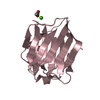



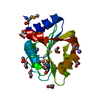



 PDBj
PDBj

